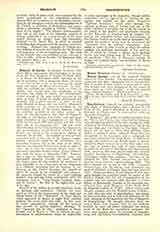

Branch Sunday, one of the medieval English names for Palm Sunday. The difficulty of procuring palms for that day’s ceremonies led to the substitution of boughs of yew, willow, or other native trees. The Sunday was often designated by the names of these trees, as “Yew Sunday” or by the general term “Branch Sunday”. (See Palm Sunday.)
JOHN B. PETERSON

